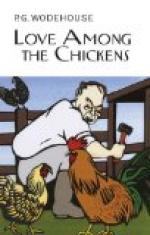“Can’t you pay some of them a little on account?” I suggested. “It would set them going again.”
“My dear old man,” said Ukridge impressively, “we need every penny of ready money we can raise for the farm. The place simply eats money. That infernal roop let us in for I don’t know what.”
That insidious epidemic had indeed proved costly. We had painted the throats of the chickens with the best turpentine—at least Ukridge and Beale had,—but in spite of their efforts, dozens had died, and we had been obliged to sink much more money than was pleasant in restocking the run. The battle which took place on the first day after the election of the new members was a sight to remember. The results of it were still noticeable in the depressed aspect of certain of the recently enrolled.
“No,” said Ukridge, summing up, “these men must wait. We can’t help their troubles. Why, good gracious, it isn’t as if they’d been waiting for the money long. We’ve not been down here much over a month. I never heard of such a scandalous thing. ’Pon my word, I’ve a good mind to go round, and have a straight talk with one or two of them. I come and settle down here, and stimulate trade, and give them large orders, and they worry me with bills when they know I’m up to my eyes in work, looking after the fowls. One can’t attend to everything. The business is just now at its most crucial point. It would be fatal to pay any attention to anything else with things as they are. These scoundrels will get paid all in good time.”
It is a peculiarity of situations of this kind that the ideas of debtor and creditor as to what constitutes a good time never coincide.
* * * * *
I am afraid that, despite the urgent need for strict attention to business, I was inclined to neglect my duties about this time. I had got into the habit of wandering off, either to the links, where I generally found the professor, sometimes Phyllis, or on long walks by myself. There was one particular walk along the cliffs, through some of the most beautiful scenery I have ever set eyes on, which more than any other suited my mood. I would work my way through the woods till I came to a small clearing on the very edge of the cliff. There I would sit and smoke by the hour. If ever I am stricken with smoker’s heart, or staggers, or tobacco amblyopia, or any other of the cheery things which doctors predict for the devotee of the weed, I shall feel that I sowed the seeds of it that summer in that little clearing overlooking the sea. A man in love needs much tobacco. A man thinking out a novel needs much tobacco. I was in the grip of both maladies. Somehow I found that my ideas flowed more readily in that spot than in any other.




